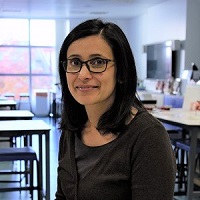
Ravita Taheem is a practitioner academic who is undertaking a PhD to address local government policy on tackling childhood obesity, supported by the NIHR and her employer, Southampton City Council.
Published: 20 July 2021
Professionals employed in local authorities and supporting services can apply for academic career support through the new NIHR Local Authority Academic Fellowship Programme and associated opportunities. NIHR funding for Ravita’s PhD studentship comes from Southampton Biomedical Research Centre.
Promoting community wellbeing through research

The NIHR has an ambition to increase the number of public health and social care practitioners who undertake research training alongside their vital work in local communities.
The Local Authority Academic Fellowship scheme (LAAF) is an NIHR pilot programme offering an academic career pathway for practitioners. The LAAF aims to strengthen capacity for health and care research in local authority settings, to inform service improvements for the benefit of people and communities now and in the future.
Ravita Taheem is a local authority ‘practitioner academic’ who, alongside her role as Senior Public Health Practitioner at Southampton City Council, is researching local government decision making on the issue of childhood obesity. This PhD project is funded jointly by Ravita’s local authority employer and the NIHR Southampton Biomedical Research Centre, through a partnership funding model which predates the new LAAF.
The career path to practitioner academic
After 11 years as an NHS dietitian, in 2013 Ravita joined the public health team at Southampton City Council, working to tackle childhood obesity and increase physical activity in the city. She also embarked on a part-time masters degree in public health at the University of Southampton, writing a dissertation on maternal risk factors for low birth weight and preterm birth. This showed her the potential for research to influence policy and inspired her to continue on an academic path.
Ravita’s role brought her into contact with Dr Kath Woods-Townsend and Professor Mark Hanson at the University of Southampton, who shared her interests and agreed to supervise a PhD. With their support, and the backing of her manager at the council, Ravita developed her research proposal and secured funding for a part-time PhD.
The partnership funding arrangement is ideal for Ravita who, as a practitioner, is committed to her work promoting better health in communities. However, it also supports her aspirations as a researcher by funding time within her working week for her PhD project, including research skills training and professional development.
“This award allows me to get the best out of both worlds as a practitioner academic. I’m still working on a range of council projects and programmes to reduce health inequalities. At the same time, I have the opportunity to step back and learn more about public health policy making whilst developing skills in qualitative research, project management and leadership.”
Practitioner academic with impact
Obesity is a major public health concern, and is a risk factor for chronic disease and reduced life expectancy. According to Public Health England, one in three children leaving primary school are overweight or living with obesity and 63% of adults are above a healthy weight. With overweight children predisposed to obesity as adults, the urgency of the issue is evident.
Although the burden of treatment falls on the NHS, the responsibilities devolved from central to local government present opportunities to influence policy at local level and contribute to the prevention of childhood obesity and associated problems in adult life. Ravita used relevant policy frameworks in her research to help shed light on some of the opportunities and barriers in local government when tackling the issue, and conducted interviews with public health practitioners and councillors.
Ravita said: “The ultimate aim of my research is to highlight the complex factors involved in local government decision making, thereby informing actions that public health officers can take to influence and progress policies for tackling childhood obesity.”
Practitioner academic status, encompassing the local authority and academia, has brought additional opportunities for Ravita. She has been invited to advise on a number of public health research projects and present her research at a conference, and has co-authored a paper in the International Journal of Health Policy and Management.
Dr Debbie Chase, Director of Public Health at Southampton City Council, welcomes this new emphasis on public health research.
“The research Ravita has conducted on tackling childhood obesity in Southampton City Council has increased the profile of the issue among local leaders and has led a more joined-up approach to it in the city.”
Ravita concluded: “I fully encourage colleagues interested in research to apply for a training award. I have an incredible opportunity to develop my research skills alongside my practitioner role, and I now see research as integral to my career path.”
Find out more about the Local Authority Academic Fellowships programme and associated opportunities, including pre-doctoral training, a doctoral fellowship and short placements which offer an opportunity to develop skills and networks.

